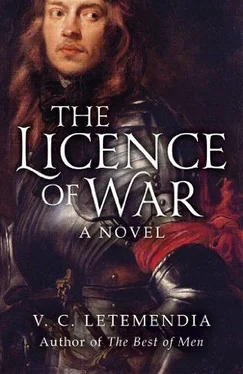Claire Letemendia - The Licence of War
Здесь есть возможность читать онлайн «Claire Letemendia - The Licence of War» весь текст электронной книги совершенно бесплатно (целиком полную версию без сокращений). В некоторых случаях можно слушать аудио, скачать через торрент в формате fb2 и присутствует краткое содержание. Год выпуска: 2014, ISBN: 2014, Издательство: McClelland & Stewart, Жанр: Исторические приключения, на английском языке. Описание произведения, (предисловие) а так же отзывы посетителей доступны на портале библиотеки ЛибКат.
- Название:The Licence of War
- Автор:
- Издательство:McClelland & Stewart
- Жанр:
- Год:2014
- ISBN:978-0-7710-4674-2
- Рейтинг книги:3 / 5. Голосов: 1
-
Избранное:Добавить в избранное
- Отзывы:
-
Ваша оценка:
- 60
- 1
- 2
- 3
- 4
- 5
The Licence of War: краткое содержание, описание и аннотация
Предлагаем к чтению аннотацию, описание, краткое содержание или предисловие (зависит от того, что написал сам автор книги «The Licence of War»). Если вы не нашли необходимую информацию о книге — напишите в комментариях, мы постараемся отыскать её.
The Licence of War — читать онлайн бесплатно полную книгу (весь текст) целиком
Ниже представлен текст книги, разбитый по страницам. Система сохранения места последней прочитанной страницы, позволяет с удобством читать онлайн бесплатно книгу «The Licence of War», без необходимости каждый раз заново искать на чём Вы остановились. Поставьте закладку, и сможете в любой момент перейти на страницу, на которой закончили чтение.
Интервал:
Закладка:
“I was not about to go with him, Digby,” she said.
“Oh I’m sure the Queen wouldn’t care that you and he are living together without the Church’s blessing, but I daresay His Majesty would object. How different he is to his father, whose Court was as licentious as a Bankside brothel. So, my dear, how did you spend the afternoon?”
“I was reading Ovid’s Ars Amatoria .”
“Hmm — as I recall, a disquisition on love, two-thirds of it advice for men, and a third for women. What was said of Ovid … That he would have been a better poet had he controlled his genius instead of permitting it to control him. Could that apply to our Mr. Beaumont?”
“No more than to you.”
“ Touché !” giggled Digby, tossing aside his napkin. “Have you read the sequel, Remedia Amoris ? It contains the most excellent advice for those who would be cured of their love.”
“Why should I wish to be cured?”
Digby felt a pang of sorrow for her. “Isabella, have you told him about your youthful mishap and its attendant consequences?”
“He knows everything about it.”
“Still, as heir to that fine Cotswold estate he will want children. You said to me that your face and your body have been your fortune, but that they could not last forever. As Ovid says, time is the devourer of all things. What will happen then?”
“If you are eager to learn, persuade his friend Dr. Seward to cast my horoscope.”
“You must get bored, in that house,” Digby said, after a silence. “Were you not supping with me, you would be twiddling your thumbs waiting for him to come home to you, like a good little wife. Except that you are not good, Isabella, and you are not married to him. Do you not crave the thrills of your former life, when you and I worked together? It was I who sent you to seduce Beaumont, if you remember.”
“Do you regret it?” she asked, as though challenging him.
“Regret is a pointless emotion. It is more profitable to look forwards than to look back.”
Isabella laughed and kissed him on the cheek. “Digby, you are a man of the future.”
“Yes,” said Digby, pleased by her observation, “I believe I am.”
VIII
For three days, Antonio had stayed away from El Caballo Blanco. He knew from Gaspar that Juana and the boy were ensconced there, in a back room, and his mind was now busy conceiving of an excuse to his wife, not for a visit to Juana but for a voyage to England. Divine Providence had engineered the events of St. Francis’s Feast Day; and the reawakening of a family tie could solve the problem of his depleted finances. Yet above all, it would appease a hunger for revenge that had gnawed at him for years.
Straight after dispatching the gypsy to Gaspar’s, he had written to a retired fellow officer, Don Miguel de Perez, whose sons Sebastián and Santiago held positions at Court in Madrid. Antonio had asked for news of the war between King Charles of England and his Parliament. Don Miguel’s reply arrived the next day, verbose and crammed with important names; the old windbag was basking in the reflected glory of his progeny.
King Charles and Queen Henrietta Maria, daughter of the valiant Henry of France, are driven to solicit money, arms, and recruits from any royal house in Europe that will assist them! And the rebellion of their heretical subjects has worsened, spreading across his entire realm, with small likelihood of a settlement. These details were relayed to Sebastián in person by His Majesty King Philip, who had them from the former ambassador to Spain, John Digby, Earl of Bristol …
Antonio read no further. He would never forget John Digby’s appointment to the Spanish Court, in 1611. That same year, James Beaumont had come to Seville.
“The bitch has a sailor’s tongue and a violent temper,” Gaspar grumbled, pocketing the money Antonio had given him. “She fought like a devil when we forced her to wash. I had to burn her rags — they were crawling with lice. Were I you, Don Antonio, I’d screw her cunt to my satisfaction, and boot her out.”
“As long as I pay you, she stays,” Antonio said.
He found Juana sitting on a pallet cradling the boy, who was suckling at her breast while she tore into a leg of roast chicken with her strong white teeth. Clean, in a decent gown, her hair combed to a shine, she excited Antonio even more; and her boy had an angel’s countenance. And my eyes , Antonio said to himself.
“Don Antonio,” she said, in her gypsy whine, “how can I thank you for your charity?”
“You can tell me about Monsieur.”
“He’s of your blood, isn’t he,” she asserted, in her normal voice.
Antonio lunged forward and grabbed a fistful of her hair. “No questions, mi gitana — I want answers. How did you two meet, so far from home?”
She winced, dropping her chicken leg. “My people had followed the Spanish troops north. Our camp was attacked, and they were all slaughtered except for me. The countryside wasn’t safe, so I went to The Hague.”
Antonio let go of her hair. “And then?”
“I was begging near a brothel — the custom was mostly rich folk who might have pity on a poor starving gypsy. But when I asked a man for a coin, he started to beat me. Monsieur heard my shrieks.”
“He was in the brothel?”
“Yes. He and the Jew who owned the brothel fought with the man, and sent him packing. Monsieur had the Jew shelter me, afterwards — it was bitter cold, that winter.”
“How very charitable of him ,” Antonio commented, his eyes on her smooth young breast. “So, he was one of the Jew’s customers.”
She unlatched the child, and pulled up the front of her gown. “No, he wasn’t. The Jew ran gaming tables, and Monsieur was his cardsharp. They were good friends and had made a pile of money together. Monsieur had a special gift with cards.”
“What sort of gift?”
“He could remember them in his head, however many rounds were played. And he was a clever cheat.”
“What did he tell you of his father and mother?”
“That crone at your table — didn’t she speak of an English lord? His father was a lord. Monsieur wouldn’t talk much about him. Whenever he did, he’d look as if he might weep. He talked even less about his mother, just what I said: she was a noble lady from this city.” Juana paused, eyeing Antonio. “I don’t know how he was raised, there in England, but if he was my son I’d have taught him better. He was the whores’ whore, at the brothel. That’s what I called him, for pleasuring them in their off hours. He had no pride.”
“I thought he was a soldier.”
“He had been, but he’d deserted. He had taken a musket ball here.” She stabbed a greasy finger at her right side, below her ribs. “He’d lost the guts to face fire.” Antonio hid disgust: a cardsharp, friends with a Jew, and a coward! “That was why we fled The Hague,” she rattled on, regaining her confidence. “The army would be looking to hang him when it turned to spring, and I had to get back to my people. And others were after him, like the man who’d beaten me. He’d wounded Monsieur when they fought, but that wasn’t enough for him: he wanted Monsieur dead. If Monsieur’s still alive, he’ll have the scar — from a broken bottle.” With the same finger, she traced a line from her left thumb up along her forearm. “And he’ll have a mark here …” She tapped the outside of her lower lip. “From a stiletto. Monsieur deserved that one — he’d been cuckolding the fellow.”
“And when did Monsieur have you , Juana?”
Histrionic outrage crossed her face. “Not ’til he’d chased me through France and into Spain. He was mad for me, and when at last he caught up with me, he raped me, over and over.”
Читать дальшеИнтервал:
Закладка:
Похожие книги на «The Licence of War»
Представляем Вашему вниманию похожие книги на «The Licence of War» списком для выбора. Мы отобрали схожую по названию и смыслу литературу в надежде предоставить читателям больше вариантов отыскать новые, интересные, ещё непрочитанные произведения.
Обсуждение, отзывы о книге «The Licence of War» и просто собственные мнения читателей. Оставьте ваши комментарии, напишите, что Вы думаете о произведении, его смысле или главных героях. Укажите что конкретно понравилось, а что нет, и почему Вы так считаете.












